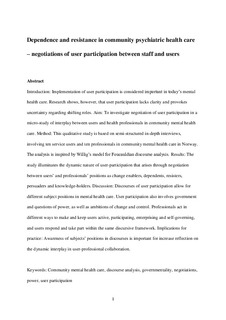Dependence and resistance in community psychiatric health care - negotiations of user participation between staff and users
Original version
Journal of Psychiatric and Mental Health Nursing. 2017, 24 (8), 600-609. 10.1111/jpm.12407Abstract
Introduction
Implementation of user participation is considered important in today's mental health care. Research shows, however, that user participation lacks clarity and provokes uncertainty regarding shifting roles.
Aim
To investigate negotiation of user participation in a microstudy of interplay between users and health professionals in community mental health care.
Method
This qualitative study is based on semi-structured in-depth interviews, involving ten service users and ten professionals in community mental health care in Norway. The analysis is inspired by Willig's model for Foucauldian discourse analysis.
Results
The study illuminates the dynamic nature of user participation that arises through negotiation between users’ and professionals’ positions as change enablers, dependents, resisters, persuaders and knowledge holders.
Discussion
Discourses of user participation allow for different subject positions in mental health care. User participation also involves government and questions of power, as well as ambitions of change and control. Professionals act in different ways to make and keep users active, participating, enterprising and self-governing, and users respond and take part within the same discursive framework.
Implications for practice
Awareness of subjects’ positions in discourses is important to increase reflection on the dynamic interplay in user–professional collaboration.
